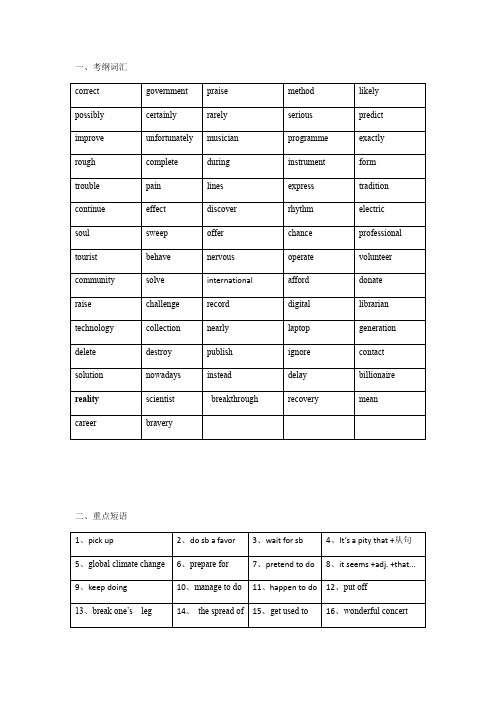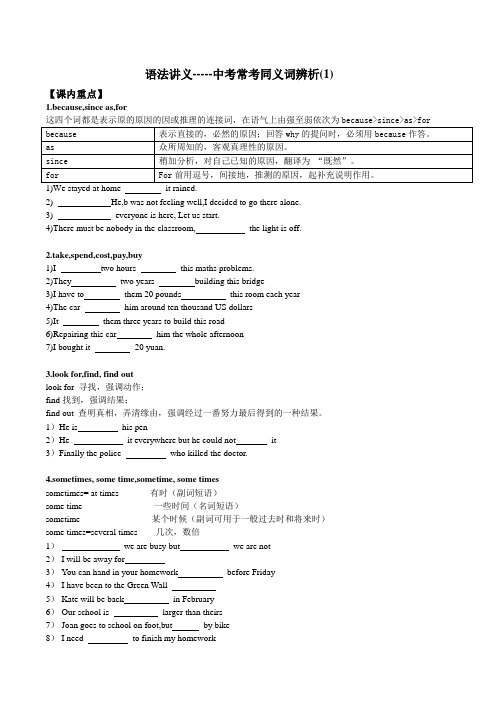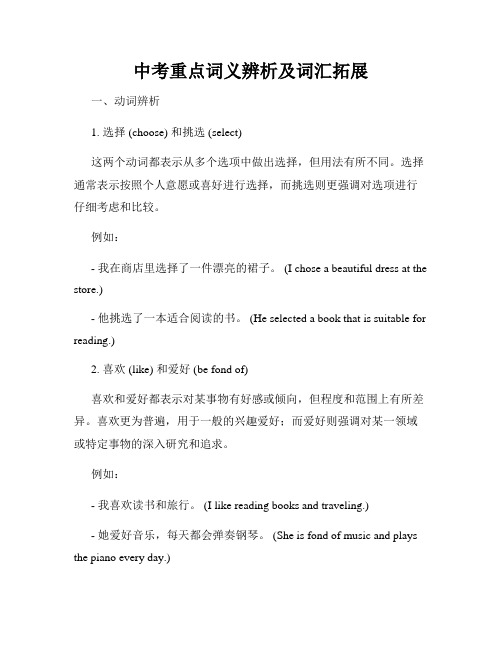牛津初中英语中考词义辨析
2020年上海牛津英语中考重点单词、短语、熟词僻义一次多义

28、not surprisingly
29、special equipment
30、in danger of
31、close down
32、besurprised at
33、be involved in
34、carry out
3、熟词僻义/一词多义/一次多性
1、receive
3、gifted /introduce
E.g.Tani and his family arrived in New York City from African in 2017. A church helped him enter the primary school, P. S. 116. Here thegiftedboy was firstintroducedto chess by a teacher Makofsky, owner of a chess club. Interested in the game, the seven-year-old boy asked him mother to allow him to join the club.
Books are easy tostoreand we don’t use any special equipment to read them. But what about the documents(文件)kept on your computer now? Will people be able to read them in 800,500 or even 10 years’time?
international
afford
donate
raise
challenge
牛津译林版中考英语常见近义词和短语辨析

牛津初中英语相似词和短语辨析1.say 意为“说”。
指用语言来表达思想,一般要强调说话的内容,必须要有宾语,但不能直接跟人做宾语,如果接表示人的宾语,其后须加介词to ,如:He said to me,“I want to buy some fruit”.He said that it was raining when they left .What did he say in the meeting?What did they say about the accident?How do you say it in English ?tell 一般不需要有说话的内容,意为“告诉”“讲述”“分辨”但可以直接接表示人的宾语,如:My grandmother often told me some interesting stories .Please tell me more about it .My parents often tell me to study hard .Can you tell the difference between tell and say ?Who did they tell about the accident ?talk 意为“交谈”,指两个人或者两个以上的人的说话。
一般也不需要跟说话的内容,如要接表示人的宾语时,其后需加介词to 或者with ,此外它还有“谈论”的意思:talk about如:When the teacher came in ,the students were talking .Lucy is very sad these days because she doesn’t know who to talk to .I stopped to talk to him when I met my old friend on the way yesterday.What did they talk about ?speak 意为“说”“发言”,强调说话的方式,也不跟说话的内容。
牛津深圳版中考英语常考同义词辩析(1)

语法讲义-----中考常考同义词辨析(1)【课内重点】1.because,since as,for1)We stayed at home it rained.2) He,b was not feeling well,I decided to go there alone.3) everyone is here, Let us start.4)There must be nobody in the classroom, the light is off.2.take,spend,cost,pay,buy1)I two hours this maths problems.2)They two years building this bridge3)I have to them 20 pounds this room each year4)The car him around ten thousand US dollars5)It them three years to build this road6)Repairing this car him the whole afternoon7)I bought it 20 yuan.3.look for,find, find outlook for 寻找,强调动作;find找到,强调结果;find out 查明真相,弄清缘由,强调经过一番努力最后得到的一种结果。
1)He is his pen2)He it everywhere but he could not it3)Finally the police who killed the doctor.4.sometimes, some time,sometime, some timessometimes= at times 有时(副词短语)some time 一些时间(名词短语)sometime 某个时候(副词可用于一般过去时和将来时)some times=several times 几次,数倍1)we are busy but we are not2)I will be away for3)You can hand in your homework before Friday4)I have been to the Green Wall5)Kate will be back in February6)Our school is larger than theirs7)Joan goes to school on foot,but by bike8)I need to finish my homework9)My house is bigger than hers10) I hope to go abroad in 5 years1)The manager Paris for three times.2)His father the United States for three years3)Where have you ? Jenny is looking for you, now she the playground4)Neither she nor I the Great Wall before5)Have you ever the farm6)----where has John ?-----To the library. He for an hour7)---Is that Jack speaking?----Sorry, he is not in right now.He the cinema with his aunt8)-----I hear your father Japan once.-------Yes, he went there last year9)----Do you often go to Shanghai?----Yes, I there three times since Christmas10)---Where is Ken? ----He is not here now. He HangZhou6.bring ,take, carry,fetchbring,带来,拿来take ,带走,与bring相对carry 运载,携带,运送的方式很多,可以用车,船也可以用手甚至用头fetch 去拿来=(go and bring)Please take these books to the library for me.They are carrying some painting to the art galleryPlease wait a minute. He has just gone out to fetch some waterBring you book to the party.7.be made of, be made from, be made in, be made into,be made up of1)The caps are made Russia2)Chair is made wood3)Bread is made corn4)Water was made Oxygen and Hydrogen5)This piece of wood will be made a small bench.【课外扩充】8.gather round,gather in ,gather up,gather fromgather round 表示聚集在...周围;聚集在一起gather in表示收获庄稼。
牛津版中考英语常用词汇辨析知识点总结(培优练)

一、选择题1.It's about ten __________ walk from here.A.minutes' B.minute's C.minutes D.minute of A解析:A【解析】【分析】【详解】句意:它离这大约步行10分钟。
考查名词所有格。
minute分钟,根据所给空前面的ten可知,应该用minute的复数形式,排除B和D,由所给空后面的walk可知,应该是10分钟的路程,用名词所有格形式,复数名词的名词所有格,如果名词复数是以s结尾的,直接加’即可,排除C,故选A。
2.With the ________ of society, our environment is becoming worse and worse. So we should do what we can ________ our environment.A.development; to protect B.developing; to protect C.development; protect D.develop; protect A解析:A【解析】【分析】【详解】句意:随着社会的发展,我们的环境变得越来越糟糕。
因此我们应该尽我们所能去保护环境。
考查名词及非谓语动词。
development发展,名词;develop发展,动词;protect保护。
根据题干中“With the ________ of society”可知the后接名词,第一空用development;结合选项可知第二句含义“我们应该尽我们所能去保护环境”,“保护环境”是目的,此处要用动词不定式作目的状语。
故选A。
3.Look at the________on the ground, and it’s telling us autumn has come.A.leaves B.leaf C.leafs D.leafes B解析:B【解析】【分析】【详解】句意:看地上的叶子,它告诉我们秋天已经来了。
译林版牛津初中英语中考英语常考易混易错重要知识点、语法讲解整理

中考英语常考易混易错重要知识点、语法讲解整理Mr Sun一、介词in/on/at区别1、在泛指在早上、在下午、在晚上、在夜间,用in如:in the morning在早上in the afternoon在下午in the evening在晚上in the night二at night在夜间2、在morning/afternoon/evening/night有定语修饰的时候,要用介词on如:on a cold morning(cold是前置定语)在一个寒冷的早晨On the morning of May1st(of May1"是后置定语)在五月一日的上午3、在某年、某月、某年某月用in,在具体的某一天、在星期儿用。
n,在具体的某一时刻、在中午用at如:in2018在2018年,in January在1月,in February,2018在2018年2月,on the first在1 号,on October1st,2018在2018年10月1号,on/at weekends=on/at the weekend在周末,on Monday在星期一,at six在六点,on weekdays在平日,at noon在中午二、used to do sth.用法1、used to do sth.肯定句式used to do sth.“过去常常做某事/以前经常做某事/曾经”,暗示现在不这样做了。
to为不定式符号,后接动词原形。
如:I used to be a worker,but now I set up a company and become a businessman.It曾经是一名工人,但是现在我成立了公司,成为了一名商人。
(现在不是工人了)The boy used to play soccer after school.这个男孩过去常常放学后踢足球。
(现在不踢了)2、used to do sth.否定句式iin+usedift/used not/didn't use+to do如:He didn't use to study luird=He usedn't to study hard.=He used not to study hard.他过去常常不努力学习。
中考重点词义辨析及词汇拓展

中考重点词义辨析及词汇拓展一、动词辨析1. 选择 (choose) 和挑选 (select)这两个动词都表示从多个选项中做出选择,但用法有所不同。
选择通常表示按照个人意愿或喜好进行选择,而挑选则更强调对选项进行仔细考虑和比较。
例如:- 我在商店里选择了一件漂亮的裙子。
(I chose a beautiful dress at the store.)- 他挑选了一本适合阅读的书。
(He selected a book that is suitable for reading.)2. 喜欢 (like) 和爱好 (be fond of)喜欢和爱好都表示对某事物有好感或倾向,但程度和范围上有所差异。
喜欢更为普遍,用于一般的兴趣爱好;而爱好则强调对某一领域或特定事物的深入研究和追求。
例如:- 我喜欢读书和旅行。
(I like reading books and traveling.)- 她爱好音乐,每天都会弹奏钢琴。
(She is fond of music and plays the piano every day.)3. 认为 (think) 和相信 (believe)认为和相信都表示个人的观点或信念,但有所区别。
认为多指基于观察、推理或经验的主观判断,而相信则强调对某一观点或信仰的坚定信心。
例如:- 我认为这个问题很复杂。
(I think this problem is complex.)- 她相信努力就会有好结果。
(She believes that hard work leads to good results.)二、名词辨析1. 图画 (picture) 和照片 (photo)图画和照片都指呈现出来的图像,但用法和形式上有所差异。
图画通常指手绘或绘画作品,而照片则指由相机拍摄得到的影像。
例如:- 这幅图画很美丽,充满了艺术感。
(This picture is beautiful and full of artistic sense.)- 我们合影了一张照片来留念。
2024年牛津深圳版英语中考语法专项第六讲中考易混动词辨析讲义
第六讲中考易混动词辨析教学内容:1.意义相近动词的用法区别。
2.常用动词习惯用法3.跟踪巩固练习一.join,take part in,attend三个词都表示"参加"Join 一般指加入"党派"或组织, 如参军,入党等take part in 只参加聚会活动;attend 一般指出席会议。
When did you brother join the army.We'll take part in social practice during the summer vacation.He'll attend an important meeting tomorrow.二.take place,happen1). take place 表示发生、举行、举办,一般指非偶然性事件的发生,即这种事件的发生一定有某种原因或事先的安排,例如:Great changes have taken place in our hometown during the past ten years.The Olympic Games of 2008 will take place in Beijing.2). happen作发生、碰巧解,一般用于偶然或突发性事件,例如:What happened to you? (一般不说:What did you happen?)I happened to see him on my way home. = It happened that I saw him on my way home.三.hear 与listen听者两不同hear 是瞬间行为动词,指听见某人说话或者做事发出的声音,即听的结果(指已听见了)。
Listen 指有意识的去听,即听的过程,是延续性不及物动词,常用Listen to(doing) sth.。
比较:I listened hard, but could hear nothing.我努力听,但什么也没听见。
江苏牛津译林版中考英语名词辨析
一、常见形近名词辨析
单词
意义
1
agreement
同意,一致,协议
argument
争论,论点,论据
arrangement
布置,安排,约定
2
award
奖品,奖
reward
报答,赏金,报酬
3
difference
不同,差额,分歧
influence
影响,势力
4
instruction
指令,说明(书)
support
支持,供养,赞助,支撑
道义上或物质上支持某人,也可指对一项事业的支持或赞助,还可指一人对另一人的赡养或抚养
7
aim
目标,目的,意图,靶子
指短期内比较具体、实际的目标,强调“集中精力去做” (联想“瞄准” ),在努力程度上,aim比purpose要弱,暗示能够实现
purpose
目的,意图
space
空间,太空,空地
不可数名词
room
房间,空间,余地
作“房间”讲时为可数名词,作“空间、余地”讲时为不可数名词
field
田地,领域,运动场
表示“在田野里”,介词用in;“在球场上”,介词用on
11
article
文章,一件,冠词
作“文章”解,指报纸、杂志上的短文
report
报告,报道,成绩单
表示通过调查给出的官方或正式的说明,通常含有对情况的分析判断,尤指下级对上级或委托机关的报告
门,房门,门口
door主要指楼、房间、碗橱、壁橱等建筑或家具上的门
gate
大门,登机门
gate通常指城墙、围墙、院墙等的门,往往译成“城门”“栅门”“闸门”等
江苏省永丰初级中学九年级英语上册《Unit 1 Star signs》词汇辨析 牛津版
1. lively / lovely二者都用作形容词,但意思有所区别。
1)lively意为“有精神的;活泼的”,可用作定语或表语。
例如:She is a clever and lively girl. 她是一个聪明而又充满活力的女孩子。
Most of children are usually lively. 大部分孩子通常都很活泼。
2)lovely意为“美丽的;可爱的”,可用作定语或表语。
例如:The girl has a lovely face. 这个女孩长得很漂亮。
The bride looked lovely in her wedding dress.那个新娘穿着结婚礼服看起来很漂亮。
2. silly / stupid二者都用作形容词,意思相近,但具体含义有所区别。
1)silly意为“蠢的,可笑的”,用来指正常智能的人,因丧失理性或缺乏常识,做出荒诞可笑之事。
例如:It is silly of you to spend money on something you don’t like.花钱买你不喜欢的东西真是愚蠢。
2)stupid 意为“愚蠢的,傻的”,指愚蠢无知的人或愚蠢的行为,更指先天智能低下,是贬义词。
例如:I think he was born stupid.我想他是天生愚蠢。
3. same / similar【观察】 I’ll never make the same mistake again.我再也不会犯同样的错误了。
The two women are wearing the same dress.那两个女人穿着一样的连衣裙。
It’s hard to believe David is the same age as Peter.很难相信大卫和彼得同龄。
No leaves are exactly the same in the world.世界上没有两片完全相同的树叶。
We have similar taste in clothing.我们对衣着的品味相近。
牛津初中英语重点词汇讲解 (完整版)
牛津初中英语重点词汇讲解A1.a bit 有点儿后面可跟形容词 a bit of 后跟不可数名词a bit of houseworkI feel a bit / a little lonely from time to time because I have just come to a new school.我偶尔因为感到有点儿孤独因为我刚刚来到一所新学校。
a little 有点儿,(比…)稍微…可修饰比较级It’s 10 a.m.. I feel a little hungry.上午10点了,我感到有点饿。
Lily is 1.65 metres tall. I am 1.63 metres tall. Lily is a little taller than I.Lily1.65米高。
我1.63米高。
Lily比我高一点。
2.ability n. 能力 be able to doDifferent people have different abilities. Find out more about his abilities.不同的人有不同的能力。
3.above prep. 在…的上面Wilson lives two floors above Wendy.Wilson住在Wendy楼上两层。
below prep. 在…的下面Mary lives six floors below Wendy. Mary住在Wendy楼下6层。
over prep. 在…的正上方,从…上跨越There is a bridge over the river.有一座桥横跨这条河。
The plane was flying over the mountain. 那时飞机正飞越那座大山。
under prep. 在…的正下方There is a bike under the tree.有一辆自行车在树下。
on prep. 在…的上面 oThere is a book on the desk.桌上有一本书。
- 1、下载文档前请自行甄别文档内容的完整性,平台不提供额外的编辑、内容补充、找答案等附加服务。
- 2、"仅部分预览"的文档,不可在线预览部分如存在完整性等问题,可反馈申请退款(可完整预览的文档不适用该条件!)。
- 3、如文档侵犯您的权益,请联系客服反馈,我们会尽快为您处理(人工客服工作时间:9:00-18:30)。
初中英语中考词义辨析:教学内容:1.几个表示穿、戴的词:wear+衣服、鞋帽、眼睛、面具等(强调状态)be in +颜色、服饰等(强调状态)put on +衣服、鞋帽、眼睛等(强调动作)dress+ 人、反身代词你最好穿上你的外套。
You’d better _____ _______ your coat.她头上戴着一朵花。
She is _______ a flower in her hair.那个穿红衣服的女孩是我妹妹。
The girl ______ _______ is my younger sister.他太小,还不会自己穿衣服。
He is too young to _______ _______.2.sometimes, sometime, some time, some timesSometimes we are busy, but sometimes we are not.这件事发生在8月的某个时候。
It happened sometime in August.我们去过长城几次。
We have been to the Great Wall some times.读完这本小说还需要一段时间。
It’ll take some time to finish reading the novel.3.win 和beat的区别:win与beat1)win(won, won)作及物动词,一般后接表示比赛或奖品的名词作宾语,也可作不及物动词,表示“赢”的结果。
2)beat(beat, beaten)作及物动词,意为“击败,战胜”,后接比赛,竞争的对手作宾语,即指人或队的名词或代词。
Beat还作不及物动词,可意为“心脏跳动”或“打击”。
win a game/ a war/ a prize beat a team/ a nation/ an opponent4. borrow 和lend的区别:1)borrow意为“借入”,指向别人借东西(borrow sth from sb)2) lend意为“借出”,指把东西借给别人(lend sth to sb)3) borrow和lend都属于非延续性动词,若表示长时间的“借”,要用延续性动词keep。
----How long can I can keep the book? 我能借用这本书多长时间?---You can _____ _____ for a week.你可以借用一周。
5. 几个表示花费的词:spend, cost, take, payspend vt.花费(金钱、时间等);度过我表哥要和我们一起过周末。
__________________________________.[拓展]1)花时间①Sb spends some time on sth/(in) doing sth.②It takes sb some time to do sthThe workers spent five days finishing the work.→ ___________________________________________.2)花钱① Sb spends some money on sth/ (on) doing sth② Sb pays some money for sth③Sth costs sb some moneyI spent 5 yuan on the flower.→____________________________.→____________________________.6. except,besides,和but的区别:except prep.不包括;除…之外,即except后的人或物不包括前面提到的范围内。
除了汤姆,我们都成功了。
We all succeeded except Tom.[拓展]1)besides 表示“除…之外(还有)”,即besides后的人或物被包括在前面提到的范围内。
除汤姆外,其他许多学生也喜欢足球。
Many other students like football _________ _______.2) but可与except换用,但but常与no one, nobody, nothing, all, everyone, everything等词连用。
这个房间里除了一张书桌外什么也没有。
There’s nothing _____ _____ ______ in the room.7.几个表示穿过的词:hard 困难的,硬的[拓展] hard adj 困难的,硬的很多女学生认为物理很难学。
Many girl students think that physics is very ________ _____learn.辨析:hard与hardly1)hard用作副词,意为“努力地,猛烈地,严重地”,常用来修饰动词。
外面雨下得如此大,我们不得不呆在家里。
It was raining so hard outside that we had to stay at home.2)hardly副词,意为“几乎不”,是否定词。
如果用在反意疑问句中,后面的短句要用肯定形式。
我几乎不能在一个小时内完成这项工作。
I can hardly finish the work in an hour.9.几个表示想要的词组:would like, want, feel likewould常缩写为’d,like 可替换为love。
would like常见的五种用法:1)would like sth想、愿意要某物2)would like to do sth想要、愿意做某事3)would like sb to do sth想要、愿意某人做某事4)Would you like sth? (客气地请求)你想要…吗?如果句中需要有表示“一些…”的词时,须用some 而不用any。
肯定答语:Yes, please. 否定答语:No, thanks.5) Would you like to do sth ?你愿意做某事吗?(表示邀请或建议)肯定答语:Yes, I’d love/ like to.否定答语:I’d love to, but I have to…(说明具体原因)辨析:would like ,want与feel like三者都有“想要”含义。
1)would like和want后接名词、代词、动词不定式或复合宾语,而feel like 后接名词、代词或v-ing形式。
2)would like比want语气更委婉。
10.need的用法:He has lied since his childhood.She has lain in bed for three years.她已经在床上躺了三天了。
He laid the book on the table.他把书放在桌子上。
Are your hens laying yet? 你的母鸡下蛋了吗?(请说出画线词在句中的意思)13. How often, how long, how soon, how far的区别:week?----Twice. Practice makes perfect.A How oftenB How many timesC How soon14. how, what引导的感叹句:该句是感叹句,用来表示强烈的感情。
常见的感叹句式:1)arrive用作不及物动词,表示到达某地时需加介词in或at.arrive in + 大地点,arrive at + 小地点,arrive后接表示地点的副词时,则不用加介词。
2)reach作及物动词,表示“到达”,后面可直接跟宾语。
3)get to表示“到达”,后接表示地点的名词,如果接表示地点的副词,则介词to 省略。
如:get there(到达那里),get here(达到这里),get home (到家)。
例题:1)我们将在天黑前达到北京。
We’ll _________ Beijing before dark.2)你们是怎么达到动物园的?How did you ____________ the zoo?3)你爸爸是什么时候到上海的?When did your father ____________ Shanghai?---Please ring me up when she ________ Beijing.----OK. I will call you as soon as she________.A arrives; arrivesB reaches; arrivesC gets to; gets toD arrives in; reaches16.none, no one, nothing的区别:1.none pron.没有一个(人或物),通常用于三个或三个以上的人或物没有一个学生喜欢那条狗。
None of the students like the dog.辨析:none和no one1)none用于指人或物,表示三个或三个以上的人或物中一个也没有,是all的否定词,可与of短语连用,作主语时谓语动词可用单数或复数。
2)no one用于指人,相当于nobody,不与of短语连用,作主语时谓语动词用单数。
例题:1)他们没有人知道这条消息。
______ of them have/ has known the news.2)没有人知道这条消息。
__________ knows the news.17. bring, take, carry和get的区别:1)bring指把某物(或人)从别处带到说话者处,常与here连用。
2)take指把某物(或人)从说话者处带到别处,常与there或away连用,与bring方向相反。
3)carry只表示“携带”,没有方向性。
4)get指到别处把某物(或人)带回来,书面语中多用fetch。
例题:①请去取些水来。
Go and _______ some water.②我可以把这本杂志带回家吗?May I ______ this magazine home?③老师让学生们把词典带到班里来。
The teacher asked the students to _______their dictionaries to the class.④他把箱子搬到楼下去。
He _______ the box downstairs.18. order的用法:1)order vt命令。
order sb to do sth命令某人做某事。
2)order n.次序,顺序。
in order按顺序,依次。
